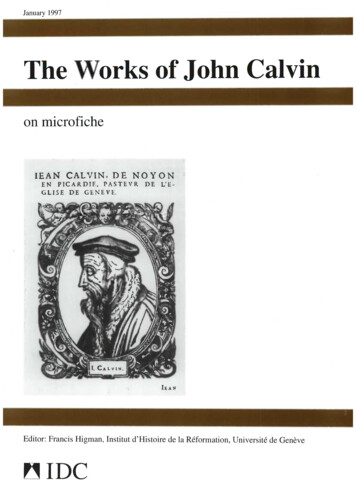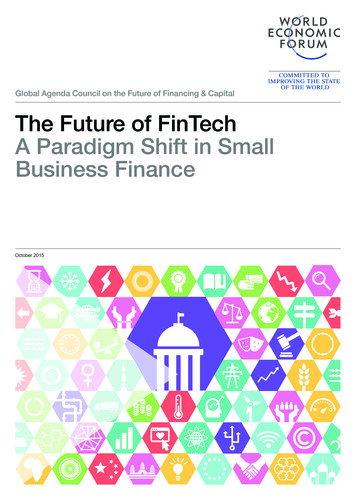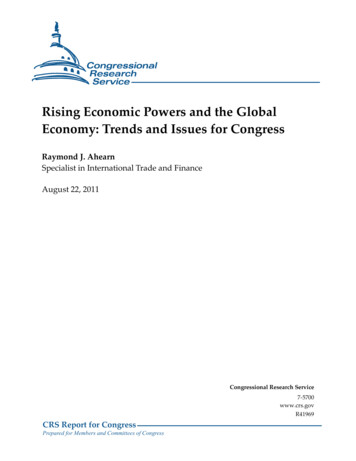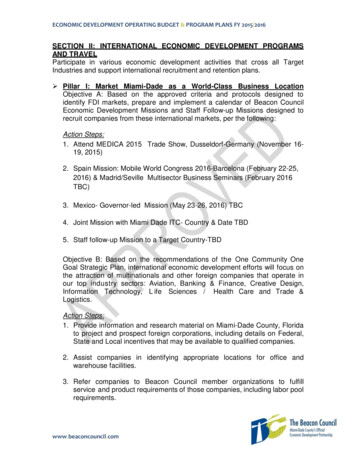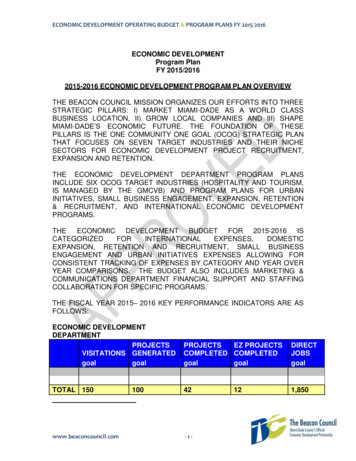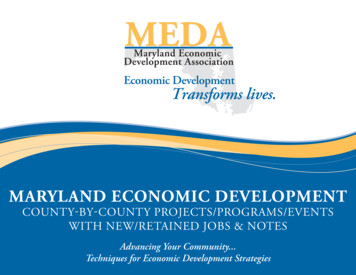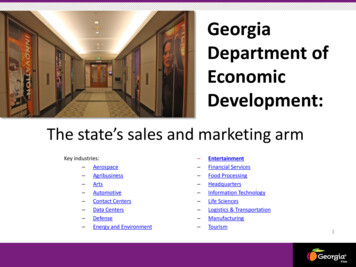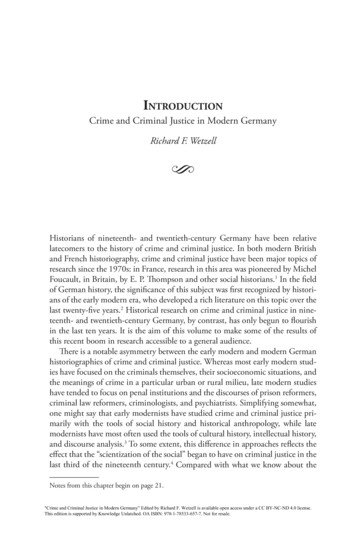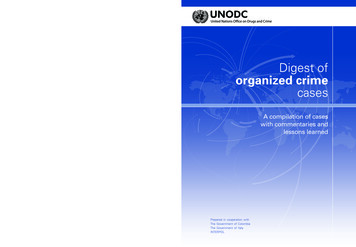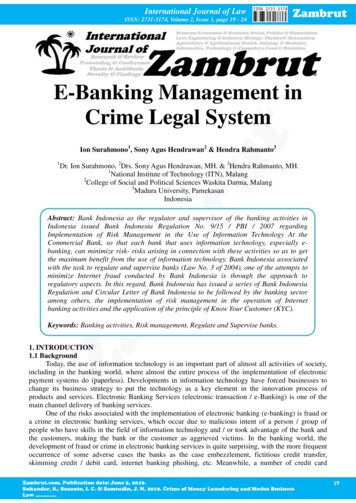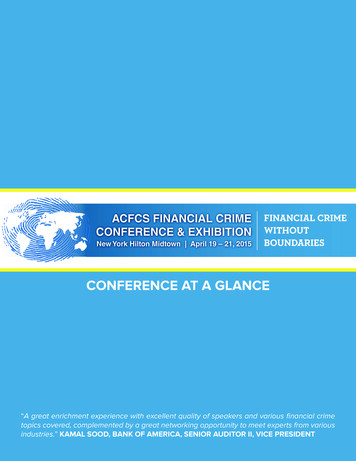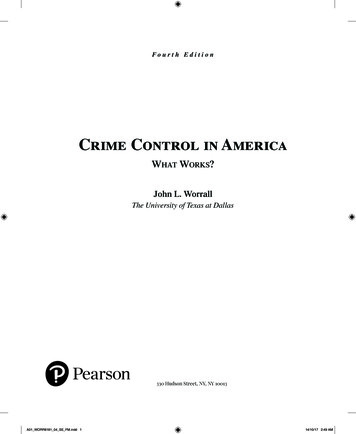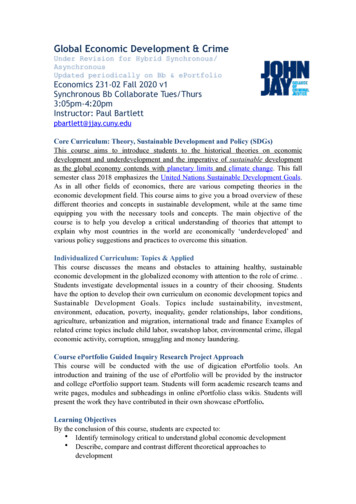
Transcription
Global Economic Development & CrimeUnder Revision for Hybrid Synchronous/AsynchronousUpdated periodically on Bb & ePortfolioEconomics 231-02 Fall 2020 v1Synchronous Bb Collaborate Tues/Thurs3:05pm-4:20pmInstructor: Paul Bartlettpbartlett@jjay.cuny.eduCore Curriculum: Theory, Sustainable Development and Policy (SDGs)This course aims to introduce students to the historical theories on economicdevelopment and underdevelopment and the imperative of sustainable developmentas the global economy contends with planetary limits and climate change. This fallsemester class 2018 emphasizes the United Nations Sustainable Development Goals.As in all other fields of economics, there are various competing theories in theeconomic development field. This course aims to give you a broad overview of thesedifferent theories and concepts in sustainable development, while at the same timeequipping you with the necessary tools and concepts. The main objective of thecourse is to help you develop a critical understanding of theories that attempt toexplain why most countries in the world are economically ‘underdeveloped’ andvarious policy suggestions and practices to overcome this situation.Individualized Curriculum: Topics & AppliedThis course discusses the means and obstacles to attaining healthy, sustainableeconomic development in the globalized economy with attention to the role of crime. .Students investigate developmental issues in a country of their choosing. Studentshave the option to develop their own curriculum on economic development topics andSustainable Development Goals. Topics include sustainability, investment,environment, education, poverty, inequality, gender relationships, labor conditions,agriculture, urbanization and migration, international trade and finance Examples ofrelated crime topics include child labor, sweatshop labor, environmental crime, illegaleconomic activity, corruption, smuggling and money laundering.Course ePortfolio Guided Inquiry Research Project ApproachThis course will be conducted with the use of digication ePortfolio tools. Anintroduction and training of the use of ePortfolio will be provided by the instructorand college ePortfolio support team. Students will form academic research teams andwrite pages, modules and subheadings in online ePortfolio class wikis. Students willpresent the work they have contributed in their own showcase ePortfolio.Learning ObjectivesBy the conclusion of this course, students are expected to: Identify terminology critical to understand global economic development Describe, compare and contrast different theoretical approaches todevelopment
Understand the imperative of Sustainable Development in the context ofplanetary limits and climate changeUnderstand the relationship of crime and economic developmentUnderstand the relationship of the MDGs and SDGs to EconomicDevelopment.Find, interpret and analyze measures of sustainable economic developmentUnderstand the relationship between development economics and other fieldsand practices.Sustainability Competencies forLearning.[Explanations on Bb Information] Systems Thinking andunderstanding ofinterconnectedness and complexity.Temporal Thinking: Long-term,foresighted reasoning andstrategizing.Interpersonal Literacy / GroupCollaboration / Communities ofPractice (interpersonal literacy;understand diverse perspectives;emotional intelligence, nonviolentcommunication).Ethical Literacy (awareness of values of self, others, and society; moral reasoning).Creativity / Imagination.Systemic change agent skills / Strategic Thinking.Sustainability Professional Competency Areas (for Certification)1. Core Sustainability Concepts. Demonstratedfamiliarity with the core issues, trends, conceptsand frameworks of sustainability.2. Stakeholder Engagement. Skills andknowledge related to collaboratively workingwith stakeholders to forward a mutuallysatisfactory beneficial agenda3. Plan Sustainability Strategies. Create acomprehensive, long-term and inclusiveapproach to the systematic implementation ofsustainability vision and initiatives4. Implement Sustainability Strategies.Managing the ongoing activities related tosuccessful integration and fulfilment ofsustainability goals.5. Evaluate and Report Sustainability Efforts.Collect, analyze and report the results ofsustainability metrics.6. Adjust plans. Continuously review efforts and adjust to meet emerging needs andopportunities.Source: ISSP Sustainability Certification Candidate Handbook, International Society forSustainability Professionals. 2017. (On Bb).Course prerequisites; ECO 101.
Course TextboookSachs, Jeffrey. (2015). The Age of Sustainable Development. NY: ColumbiaUniversity Press. ISBN 9780231173155John Jay Bookstore:Video lectures for each chapter, for this class only, do not share links outside of thisclass. Video Playlist for each chapter by author Jeffrey Sachs ww.youtube.com/playlist?list PLSuwqsAnJMtzb-2KICvyzu2kAdVntPldn Optional take the MOOC course alongside the JJay course, get extra credit forcompleting. Optional EdX Certificate (for fee 49)UN SDSN SDG Academy MOOC Course (free) on-demand selfpaced: le-development/Supplemental Textbooks. Excerpts on Bb and/or on Reserve.[Students do not need to purchase, but inexpensive old editions maybe usefulreferences]Cypher, James. Process of Economic Development. (4th ed.) Routledge. ISBN-13:978-0415643283 ISBN-10: 0415643287 Older edition OK.Chang, Ha-Joon. Rethinking Economic Development. Anthem. ISBN-13:000-1843311100 ISBN-10: 1843311100 [Excerpts on Bb]Todaro & Smith, Economic Development (12th ed.) Pearson. ISBN-10: 0133406784ISBN-13: 978-0133406788 [11th edition OK and on Reserve]The textbooks are supplemented by other readings posted on Blackboard. Thereadings may be revised as the course proceeds, according to the student interests,current events and at the discretion of the instructor.AssignmentsAssignments posted on Blackboard and ePortfolio. Assignment guides and rubricsprovided on Bb and ePortfolio.Course websiteUse of the course web sites and e-mail is required for all students. The course web siteis located on Blackboard: http://www.jjay.cuny.edu/blackboard and DigicationePortfolio Class Wiki (forthcoming).Accommodations & AccessibilityJJay Website https://www.jjay.cuny.edu/accessibility Office of Accessibility Services (OAS)
Students who believe that they may need an accommodation due to adisability are encouraged to immediately contact the Office of AccessibilityServices (OAS) in the New Building, room L.66 (212 237 8031), oraccessibilityservices@jjay.cuny.edu. Students are welcome but not required tospeak with the instructor privately to discuss specific needs for the class.Students with disabilities are entitled to confidentiality over disability-relatedstatus or details. Students are not required to disclose their specific disabilityto their instructors or anyone else.Blackboard Accessibility. CUNY has a Blackboard "Accessibility Course"online, located at ackboard/, that is self-paced in 8 short modules. This course also links toCUNY's accessibility website, which is full of training resources and tools.Blackboard supportClassroom Lab Support Services (CLSS) forms the Blackboard Student SupportGroup to provide John Jay College students with a dedicated team of staff to smoothstudents' academic experiences of integrated Blackboard education. Students with anyBlackboard issues or questions may visit and consult with the team located in CLSSoffice L2.73.10 NB during normal business hours or send their questions toblackboardstudent@jjay.cuny.edu or call 212-237-8200. For student Blackboardonline tutorials and FAQ, please see the link supportePortfolioThis course makes use of ePortfolio, a web page based form of expressing our workand collaboration, in addition to Blackboard. All assignment work are posted to theClass Wiki Website and your personal website. You will get trained on accessing thesite and creating their ePortfolios during training sessions in a computer lab duringclass. You will be informed via Bb announcements when training sessions areavailable outside of class.Student Support & Tutorials. If you would like to learn more about ePortfoliobefore your training or after, visit http://www.jjay.cuny.edu/eportfolio and select theoption For Students where you can access online tutorials for using Digication.ePortfolio Lab, Room 008W, Westport, 11am - 5pm, Monday - Friday. LearningTech & Support strongly encourages students to e-mail in advanceePortfolio@jjay.cuny.edu indicating when they wish to drop by.Office HoursNew Building, 9.63.25 SE corner adjunct area.By appointment ZoomGradingYour overall performance will be evaluated using the standard John Jay Collegegrading scale (0 - 100) and the standard GPA scale (0 - 4.0). Rubrics guides have four
levels. Level 1 (0-69.9): F, D-, D, D ; Level 2 (70-79.9): C-, C, C ; Level 3(80-89.9): B-, B, B Level 4 (90-100): A- to A.(Rubrics and assignment guides are provided on Bb and ePortfolio.)Grade - Numerical Value Percentage Equivalent - GPA scaleA93.0-100.04.0A90.0- 92.93.7B 87.1- 89.93.3B83.0- 87.03.0B80.0- 82.92.7C 77.1- 79.92.3C73.0- 77.02.0C70.0- 72.91.7D 67.1- 69.91.3D63.0- 67.01.0D60.0- 62.90.7FBelow 60.0 0.0EvaluationCourse grade components Hybrid Eco 231.o Participation: Weekly Discussion Board and in-class Discussion (35%)o Team Wiki Country Projects and ePortfolio (35%);o Reflection Essay Exams: Midterm & Final (30%).Assignment evaluation Guides and Rubrics on Blackboard.Academic Honesty and PlagiarismPlagiarism is the presentation of someone else’s ideas, words, or artistic, scientific, ortechnical work as one’s own creation. Using the ideas or work of another ispermissible only when the original author is identified. Paraphrasing andsummarizing, as well as direct quotations require citations to the original source. It isthe student’s responsibility to recognize the difference between statements that arecommon knowledge (which do not require documentation) and restatements of theideas of others. Paraphrase, summary and direct quotations are acceptable forms ofrestatement, as long as the source are cited. Students, who are unsure how and whento provide documentation, are advised to consult with me. The Library has free guidesdesigned to help students with problems of documentation.(John Jay College of Criminal Justice Undergraduate Bulletin, http://www.jjay.cuny.edu/academics/654.php see Chapter IV Academic Standards)Plagiarism and other forms of academic dishonesty will result in a grade of ‘F’ for thecourse, and a formal report of the incident to your department chair and the dean.The Writing CenterThe Writing Center (http://jjcweb.jjay.cuny.edu/writing/homepage.htm) is a servicethat provides free tutoring to students of John Jay College. The Writing Center has a
staff of trained tutors who work with you to help you become a more effective writer,from planning and organizing a paper, to writing and then proofreading it as well asapplying APA. The Writing Center is a valuable resource, and I encourage you to useit.Disability PolicyStudents with disabilities will be provided reasonable accommodations if they aredetermined eligible by the Office of Accessibility Service (OAS). Prior to grantingdisability accommodations in this course, the instructor must receive writtenverification of a student’s eligibility from the OAS (phone #212-237-8031). It is thestudents’ responsibility to initiate contact with that office and follow the establishedprocedures for having the accommodations notice sent to the instructor.Reading Content (To Be Confirmed)Readings Set 1 Jeff Sachs, Age of Sustainable Development.Sachs, Jeffrey, Age of Sustainable Development. (Assigned Textbook)Ch 1 Introduction: What is Sustainable DevelopmentCh 2 InequalityCh 3 HistoryCh 4 Why some countries develop, and others do not.Ch 5 Extreme PovertyCh 6 Planetary Boundaries (& Sweden Resilience Center SupplementalContent)Readings Set 2 Institutional Political Economy Approach to Development(including the context of "history of thought" and practice).Ha-Joon Chang, Ed., Rethinking Development [BB Content Readings]Introduction, Pages 1-9.Chapter 1, Changing Perspectives in Development Economics, John Toye(Read to understand context of why economic development theory andpractice legitimacy was questioned, and have an idea why the professionturned to a more practical empirical institutional approach with the MDGs)Chapter 2. The Market, the State, and Institutions in EconomicDevelopment(Important to read carefully, this is a very good articulation ofthe "Institutional Political Economy Approach")Regional Development Choose one of three Chang chapters on RegionalDevelopment: Latin America, SE Asia, Africa.Readings Set 3 Theory [BB Content Readings]Cypher, Endogenous Growth Theory (optional)
Cypher, Heterodox Theories of DevelopmentPostcolonial Theory of Development1. Peet, Poststructuralism, Postcolonialism,and Postdevelopmentalism2. Sidi, Omar RethinkingDevelopment from a Postcolonial PerspectiveReadings Set 4 Topics & SDGsChapters 7-14 Sachs, Jeffrey, Age of Sustainable Development.(Assigned Textbook)Supplemental Content on BbCurriculum detail: assignments, guides, rubrics and schedule to be posted onePortfolio and Blackboard.
This course will be conducted with the use of digication ePortfolio tools. An introduction and training of the use of ePortfolio will be provided by the instructor and college ePortfolio support team. Students will form academic research teams and write pages, modules and subheadings in o
